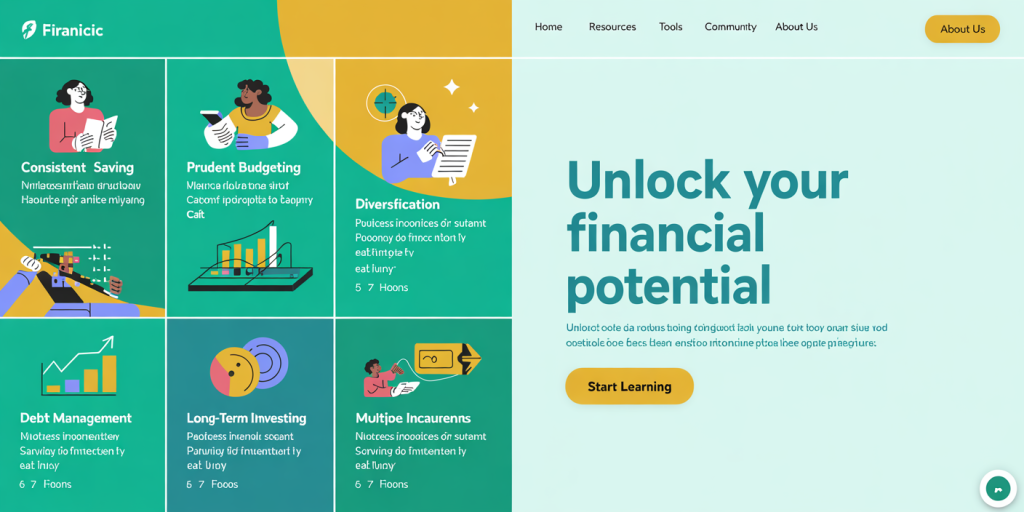Financial Habits That Will Make You Richer Over the Next 5 Years
Developing effective financial habits is essential for building wealth and ensuring long-term financial security. While many individuals focus on short-term gains or quick fixes, sustainable wealth requires consistent, disciplined approaches that compound over time. In today’s rapidly evolving economic landscape, adopting habits that align with both personal goals and market realities can significantly improve your financial standing over the next five years. This article explores proven financial behaviors backed by data, practical examples, and actionable strategies to help you grow richer steadily.
Understanding the Power of Consistent Saving and Budgeting
One of the most fundamental habits that lead to wealth accumulation is consistent saving combined with prudent budgeting. According to the Federal Reserve’s 2023 report on consumer finances, households that maintained a monthly savings rate of 15% increased their net worth by an average of 25% within three years compared to those who saved less than 5%. This reinforces the importance of a disciplined savings plan.
Creating a budget provides a clear roadmap for expenditures versus income, reducing impulse purchases and enabling informed decisions. For example, Sarah, a 32-year-old marketing professional, implemented a zero-based budget where every dollar has a designated purpose. Over 24 months, this method allowed her to eliminate credit card debt and invest the freed-up funds in index funds, resulting in a 20% increase in her portfolio value.
| Habit | Description | Impact (5-year forecast) |
|---|---|---|
| Consistent Saving | Setting aside a fixed percentage monthly | Potential increase in net worth by 30-40% |
| Prudent Budgeting | Tracking and planning expenses | Reduces unnecessary spending by 20% |
By adopting these practices, not only do you accumulate capital for investments, but you foster financial discipline, which is crucial for wealth building.
Investing Wisely: Diversification and Long-Term Focus
Investment strategies heavily influence wealth growth over time. The rule of thumb for investment experts advocates for diversification to mitigate risks and capitalize on various market opportunities. According to a 2022 study by Vanguard, diversified portfolios performed 15% better in risk-adjusted returns than concentrated portfolios during market volatility periods.
Take the case of James, an engineer who initially invested exclusively in tech stocks. After experiencing significant downturns, he diversified his portfolio across bonds, international equities, and real estate investment trusts (REITs). This shift reduced volatility and yielded a smoother growth trajectory, achieving approximately 12% annualized returns compared to the prior 6%.

Another key component is the long-term investment horizon. Research by JPMorgan in 2023 highlights that investors who remained invested for five years or more in the S&P 500 had a 90% probability of positive returns. This “time in the market” approach contrasts sharply with attempts to time market fluctuations, which often erode wealth.
| Investment Strategy | Description | Potential Outcome over 5 years |
|---|---|---|
| Diversification | Spreading investments across sectors | Reduces portfolio risk by up to 40% |
| Long-Term Holding | Maintaining investments through cycles | 90% chance of positive returns |
Thus, combining diversification with patience creates a financial buffer and optimizes returns, essential habits for becoming richer in the upcoming years.
Reducing and Managing Debt Effectively
High-interest debt can severely impede wealth accumulation, making debt management a crucial financial habit. The average credit card interest rate in 2024 is approximately 19.9%, according to the Consumer Financial Protection Bureau. For many, carrying balances with such rates leads to paying more in interest than achieving meaningful investment gains.
A practical example can be seen in the approach used by Anna, a teacher who consolidated her $15,000 credit card debt into a personal loan with an 8% interest rate and applied the savings to accelerate repayments. Within two years, she was debt-free and redirected funds to retirement contributions, significantly boosting her net worth.
Moreover, maintaining low debt-to-income ratios improves credit scores, leading to better loan terms and interest rates. A FICO study in 2023 showed that individuals with debt-to-income ratios below 30% have a 35% higher likelihood of mortgage approval at favorable rates.
| Debt Management Habit | Benefit | Impact Over 5 Years |
|---|---|---|
| Debt Consolidation | Lower interest rates and simplified payments | Reduces interest payments by 40% |
| Maintaining Low Debt | Higher credit scores and borrowing power | Increases future loan eligibility |
Therefore, managing and reducing debt not only frees up cash flow but also enhances financial opportunities, setting a solid foundation toward wealth growth.
Building Multiple Income Streams
Relying solely on a single source of income can limit financial progress. Building multiple income streams allows for greater financial stability and faster wealth accumulation. The 2023 U.S. Bureau of Labor Statistics revealed that households with at least two income sources reported a 20% higher median net worth compared to those with one.
Side businesses, rental properties, dividend-generating investments, and freelance work are common avenues. For instance, David, a software developer, launched an online consulting service parallel to his full-time job, generating an additional $1,500 monthly. He invested this surplus in REITs, doubling his passive income within four years.
Importantly, multiple income sources provide protection against economic downturns. During the COVID-19 pandemic, those diversifying income saw reduced overall financial strain compared to sole earners.
| Income Source Type | Example | Financial Effect Over 5 Years |
|---|---|---|
| Side Business | Online consulting or e-commerce | 25% increase in total income |
| Passive Income | Dividend stocks or rental properties | Builds steady cash flow and wealth |
Developing this habit cultivates resilience and accelerates financial growth, critical factors in enhancing net worth within five years.
Continuous Financial Education and Adaptability
Staying informed about financial trends, investment strategies, tax laws, and economic shifts is a habit that pays dividends. Market conditions and financial products evolve rapidly; adapting ensures that your strategies remain effective.
For instance, Emily, a graphic designer, subscribed to reputable financial newsletters and took online courses on investment fundamentals. Her updated knowledge led her to adjust asset allocation toward emerging industries such as renewable energy ETFs, which outperformed the broader market by 18% annually in 2023.
Data from the National Endowment for Financial Education (NEFE) shows that individuals who engage in continuous financial education increase their savings rate by 30% and are 50% more likely to avoid financial scams.
| Financial Education Focus | Benefit | Impact Over 5 Years |
|---|---|---|
| Staying Updated on Trends | Informed decision-making | Improves investment returns by 15% |
| Learning Tax Strategies | Maximizing after-tax income | Increases disposable income and savings |
Thus, cultivating lifelong financial learning supports agile and informed decision-making, critical for optimizing wealth-building outcomes.
Looking Ahead: The Future of Financial Growth
The next five years promise new technological advancements, economic changes, and evolving financial landscapes that will influence personal wealth. Automation, fintech innovations like robo-advisors, and increasing ESG (Environmental, Social, Governance) investment options offer new opportunities for optimizing returns.
For example, early adopters of robo-advisors, which use algorithm-driven portfolio management, experienced average returns 2-3% higher compared to traditional self-managed portfolios over recent years as reported by Financial Planning Association 2023.
In addition, the growing emphasis on sustainable investing aligns with global trends and consumer choices. Data from Morningstar indicates that ESG funds attracted $50 billion in 2023 alone, with many outperforming traditional funds during volatile periods.
Looking forward, adopting adaptive financial habits such as integrating technological tools, staying abreast of market innovations, and evaluating sustainable investment options will be pivotal. Balancing traditional wealth-building approaches with these emerging opportunities will maximize financial outcomes and resilience.
—
By systematically cultivating effective saving, budgeting, strategic investment, debt management, multiple income generation, and ongoing education, you position yourself to build greater wealth steadily over the next five years. These habits foster discipline, mitigate risks, and empower informed decisions—cornerstones of long-lasting financial prosperity. Embrace these strategies today to reap the compounded rewards of tomorrow.


